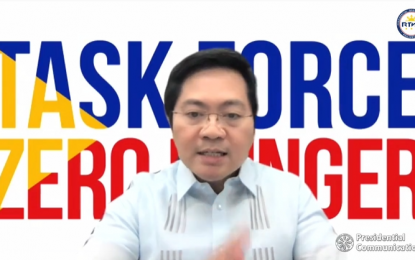
ZERO HUNGER BY 2030. Cabinet Secretary and chair of the Inter-Agency Task Force on Zero Hunger Karlo Nograles talks about the efforts of the government in 2020 to lower the hunger index. He said they are targeting to at least bring back hunger incidence to pre-pandemic level. (Screengrab from Zoom conference)
MANILA – Cabinet Secretary Karlo Nograles, chair of the Inter-Agency Task Force on Zero Hunger, on Monday said the group is “well on its way” of achieving the goals stipulated in the National Food Policy.
However, he said due to the impact of the coronavirus disease 2019 (Covid-19) pandemic, the task force sought to bring back the hunger incidence to the pre-pandemic level which was 8.8 percent.
“With Covid-19, it doubled to 16 percent, then it rose to 20 percent and even to a high of 30 percent. But now it is back to 16. For 2021, our goal is to at least bring back the hunger incidence in the country to 8.8 percent, pre-pandemic,” he shared in a media interview during the first anniversary of the creation of the task force.
President Rodrigo Duterte signed Executive Order No. 101 that created the task force in January 2020.
He cited the “need to carefully coordinate, rationalize, monitor, and assess the efforts of concerned government agencies and instrumentalities to ensure a whole-of-government approach to eradicating hunger and achieving food security.”
An SWS survey in 2020 showed 7.6 million Filipinos said they experienced hunger during the pandemic.
Nograles said he recognizes this concern, adding that even the United Nations declared it was “impossible” for countries to achieve their zero hunger campaigns due to the problems brought by the pandemic.
“The very essence of this task force is the recognition of the problem of hunger. That it persists despite previous efforts,” he said.
National Food Policy
Crafted in October last year, the National Food Policy aims to strengthen government agencies, both at the national and regional levels, and local government units to provide citizens necessary programs and interventions to end hunger, achieve food security, improve nutrition, and attain sustainable agriculture.
The policy is a detailed orientation for the efficient use of government resources.
Nograles said the IATF on Zero Hunger created technical working groups to ensure coordination of government programs on hunger.
Their key result areas highlight the review of existing policies, rules, and regulations related to hunger as well as ensuring the availability and affordability of food.
The Department of Agriculture, for its part, highlighted its growth despite the series of challenges it faced last year.
Agriculture Secretary William Dar said they are keeping their focus on raising the production value of farmers and fisherfolk to elevate their target in sufficiency levels of rice, corn, and livestock, among others.
Nograles said the National Food Policy aims to ensure food security in the country by supporting farmers and fisherfolk through increasing their productivity and income.
“The more food and agricultural products we have, the more we can ensure food prices and that we will never run out of food,” he said.
The new policy will likewise ensure that food will not just be available but also accessible, by bringing agricultural products to the markets.
“When President Duterte’s term ends in June 2022, the National Food Policy will formally be turned over to the next administration and hopefully they will accept and continue what we have started. The goal is to achieve sustainable development goal 2 which is Zero Hunger by 2030,” he said.
He also mentioned the participation of the private sector through the Pilipinas Kontra Gutom campaign.
It is a multi-sectoral movement composed of founding members Coca-Cola Philippines, Dole Philippines, J&J Philippines, McDonald’s, Metrobank, and San Miguel Corporation that have committed an initial 100,000 meals, and 3,000 infant kits to be distributed to areas in most need.
Companies Lazada Philippines, RFM Corporation, Century Pacific Food Inc., Unilever, Gawad Kalinga, and RISE Against Hunger Philippines are also participants of the campaign.
“The responsibility for ending hunger in the Philippines is in all of us. The Pilipinas Kontra Gutom ignites the Bayanihan spirit to call on all organizations and each and every Filipino to help our fellow Filipinos experiencing hunger and malnutrition,” he said. (PNA)
